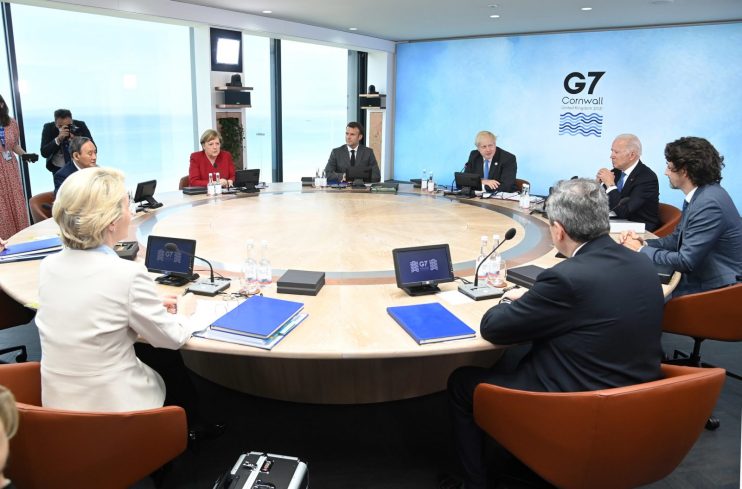G7: What was agreed at the 2021 Cornwall summit on vaccines to climate change

The 2021 G7 summit wrapped up today, after three days of meetings between leaders of the world’s richest democracies on Covid vaccines, the globe’s economic recovery and the environment.
Amongst some occasional drama around Brexit and the UK-EU relationship, the seven leaders – from the US, UK, Canada, Italy, France, Japan and Germany – came to a series of agreements on things like vaccine distribution, climate change and China.
Below are some of the most important takeaways from the final communique.
Vaccines
The G7 leaders agreed to donate 1bn Covid vaccines to the world’s poorest nations over the next year, with a commitment for another 1bn after that.
US President Joe Biden made the largest commitment with 500m doses, while UK Prime Minister Boris Johnson and Canadian Prime Minister Justin Trudeau also pledged 100m each.
France is due to donate 60m doses.
The World Health Organisation (WHO) has said 11bn doses need to be distributed across the world to end the pandemic.
WHO boss Dr Tedros Adhanom Ghebreyesus is calling for a waiver of intellectual property rights by pharmaceutical companies, however there has been push back by some G7 countries on this proposal.
Johnson said he instead supported pharmaceutical companies offering vaccines at cost.
Climate change and environment
The summit also saw leaders agree to end direct government support for coal-powered energy without using technology to offset carbon emissions, while also supporting a $2 trillion transition fund.
The G7 leaders also committed to conserving or protecting 30 per cent of their countries’ land and marine areas by 2030.
All nations also reaffirmed their support for reach net-zero carbon emissions by 2050.
Labour criticised the communique for not having enough details around how to reach some of the overarching environmental goals.
“With less than six months until COP 26 the Government must raise the ambition and work constructively with countries across the world to deliver for people in Britain and around the world,” shadow foreign secretary Lisa Nandy said.
China
Combatting China’s growing global dominance was a key theme throughout the G7 summit in Cornwall, with the final communique referencing the country four times.
The joint statement, signed by the G7 leaders, called out China’s ethnic cleansing campaign of Uyghur Muslims in Xinjiang, urged the Chinese government to co-operate into investigations into the origins of Covid-19 and also committed to “challenging” the country’s unfair economic and trade policies.
The communique also highlighted its concern about China’s increasing attempts to expand in the South China Sea, which is creating tensions with other Asian nations.
Joe Biden used much of his G7 summit press conference to call out China’s human rights abuses, unfair trading practices and increasingly aggressive foreign policy manoeuvres.
“Last time the G7 met there was no mention of China, but this time there is,” he said.
“I think we’re in a contest, not with China per se, but a contest with autocrats, autocratic governments around the world as to whether or not democracies can compete with them in a rapidly changing 21st century.”
Future pandemics
G7 leaders committed to working more closely in the future to prevent new pandemics, which will include mechanisms for sharing data and intelligence.
The group came to an agreement that they will try to ensure the availability of effective vaccines, treatment and diagnostic tests within the first 100 days of any future pandemic.
This will be underlined by things like the UK and US’ new joint partnership between the UK Health Security Agency (UKHSA) and Centers for Disease Control and Prevention (CDC).
Infrastructure
One of the key announcements of the summit was a joint new green infrastructure plan for developing nations, which is set to challenge China’s Belt and Road Initiative.
China’s Belt and Road Initiative has seen the country spend trillions on infrastructure in more than 100 countries across the globe in an attempt to build a new interconnected silk road.
Beijing has widely been accused of using the scheme to grow its global economic influence and of holding countries to ransom over investments made.
The new Build Back Better for the World programme will see the globe’s richest democracies provide “high quality financing for vital infrastructure” in places like Africa and Asia.
Details on how the fund will be distributed or how much each G7 country will donate has not yet been decided.
Biden said the plan would “help meet the more than $40 trillion needed” to build vital infrastructure in the developing world, while also acting as a bulwark against China.